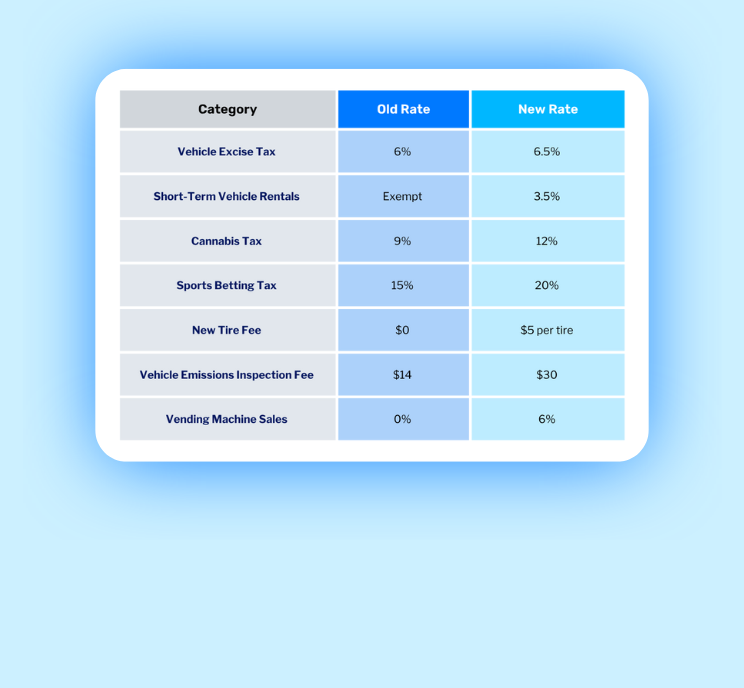Authored By Sarah Reeves, CPA | Tax
Other Contributors: Cindy Vacovsky, Madison Brown, John King, and Alex Roos
The acceleration of economic nexus rules—in conjunction with the growth in digital services, the transition to remote work or a “work anywhere” environment, and even the increase in online sales due to the pandemic—have created a perfect storm of new state exposure for companies.
What is Economic Nexus?
On June 21, 2018, the U.S. Supreme Court released its decision in South Dakota v. Wayfair, allowing states to require businesses to collect and remit sales tax even if the business has no physical presence in the state—making the former “physical presence” standard no longer applicable. Today, all states have since adopted “economic nexus” thresholds for sales tax.
Economic nexus is established when an out-of-state business enjoys the privilege of doing business in-state, regardless of whether they have a physical presence in that state. For sales tax, these thresholds are usually based on an annual gross sales amount or quantity of individual annual transactions. For example, an out-of-state vendor is subject to sales tax collection in Maryland if gross taxable sales exceed $100,000 or they have 200 or more separate transactions.
Prior to Wayfair, most states already had an economic nexus standard for income tax—albeit the standard could be more of a gray area based on facts and circumstances. While the Wayfair case did address sales tax, its application extends to income tax, and several states have responded by making this economic nexus determination clearer and adopting “bright-line” presence tests.
For example, Pennsylvania adopted a $500,000 gross receipts threshold for tax years beginning on or after January 1, 2020. Other states with specific sales dollar thresholds include Alabama, California, Colorado, Connecticut, Hawaii, Massachusetts, Maine, Michigan, New York, Tennessee, and Texas. These bright-line presence tests do not override the Federal Public Law (P.L.) 86-272 protection from income tax for companies whose activities are limited to solicitation of orders for tangible personal property, as discussed in more detail below.
Key Takeaway: With more sales taking place online due to the pandemic, companies should review their taxation policies and protocols to ensure they are not exceeding these sales dollar or transaction thresholds in any state or local tax jurisdiction. It is important to monitor these thresholds carefully (and update your review on at least an annual basis), so the business can register and begin making estimated income tax payments and collecting sales tax from customers in a timely manner. If a business fails to collect the required sales tax, it is still responsible for remitting that tax to the state.
Multistate Tax Commission’s Updated Guidance on Internet Activities
Out-of-state businesses are afforded protection from income tax under P.L. 86-272 when their only activity in the state is the solicitation of orders by an employee or representative for sales of tangible personal property. These orders must be sent outside of the state for approval or rejection and filled by shipment or delivery from a point outside the state.
The Multistate Tax Commission (MTC) adopted a revised statement on P.L. 86-272 on August 4, 2021 to address changes in the way business is being increasingly conducted over the internet. The statement is not binding to all states, but it provides a framework and general guidance for states to use in adopting legislation. This revised statement provides examples of website activities that exceed sales solicitation and would subject the business to state income tax.
Unprotected website activities directed at in-state customers include:
- Post-sale assistance via electronic chat or e-mail initiated through the business’ website
- Solicitation and receipt of online applications for a branded credit card of the business
- Access to submit an online application for non-sales positions of employment
- Use of internet “cookies” for the purpose of adjusting production schedules or inventory amounts, developing new products, or identifying new items to sell
- Sale of extended warranty plans
- Remote tech support (transmitting code or other electronic instructions)
- Contract with marketplace facilitator in states where the marketplace facilitator has a fulfillment center
- Stream videos and music for a charge
Website activities that are still protected include:
- Post-sale assistance via a static list of frequently asked questions
- Use of internet “cookies” that gather customer information as part of order solicitation such as remembering items in shopping cart, retaining customer information so they do not need to re-enter for future orders (shipping address, credit card info, etc.), and reminding customers of product they viewed previously
- Offer product (tangible personal property) for sale with ability to search, read product descriptions, and purchase
Key Takeaway: Pay attention to cookie content, internet chat features, and other internet activities that could create income tax for the business.
The Impact Remote Workers Have on Nexus
In March of 2020, the onset of the Covid-19 pandemic put an end to “traditional” in-office work and businesses had to quickly adapt to a volatile work environment and ever-changing conditions. Now, employers are redefining the workplace. Before making any decisions about the format that might be best for your organization, it is important to first consider the tax implications of teleworking as it relates to state nexus.
Telecommuting on a regular basis in a state creates an income tax nexus unless the employee’s activities are covered under the exception for sales solicitation of tangible personal property as discussed above. Even one employee working part-time in a state could create a significant tax exposure, depending on where the company’s customers are located and the state’s rules for sourcing sales to customers.
As the pandemic forced a remote work environment, many states provided temporary relief for employees working from home due to stay-at home or state-of-emergency orders.
- Not all states responded in kind, creating three approaches to pandemic-related telework:
- No guidance issued, leaving taxpayers to presume that normal rules apply
- Guidance issued specifically stating that pre-pandemic rules remain in effect
Temporary relief granted which provides that the state will not assert income tax nexus solely based on an employee temporarily working from home due to the pandemic
Employees hired with the intention that they will work from home permanently (regardless of the pandemic) would not generally meet this exception. For states granting temporary relief, the exception is tied to varying factors and ends either on a specified date or based on when a state-of-emergency is lifted. For example, New Jersey grants the exception for employees working from home because of closures due to Covid-19 and/or the employer’s social distancing policy. Washington, D.C. grants an exception until 90 days after the mayor declares an end to the public emergency, which had been extended to January 7, 2022.
Most states’ temporary relief has now expired, including the following:
- Maryland – as of July 1, 2021
- New Jersey – as of September 30, 2021
- Pennsylvania – as of June 30, 2021
Key Takeaway: As companies decide whether to continue teleworking, they should weigh the potential tax implications. Companies soliciting sales of tangible personal property, who are protected from income tax in a state under P.L. 86-272, may not want to lose that valuable protection by having non-sales employees work remotely. At a minimum, the finance team should understand if there will be additional tax costs and compliance costs when hiring remote employees.
Companies that provide services or the sale of intangibles, who may not have risen to the level of economic nexus before, will now have nexus with a remote worker. Remote employees could also impact state apportionment factors in states which include payroll as a factor or states which source sales based on where the work is performed. Additionally, remote work could impact state and local tax credits that are tied to the creation or retention of jobs within a designated geographic area and may subject the employer to business and employer taxes in various cities and localities.
In closing, all companies should assess the financial statement impact of these nexus determinations on the effective rate and potential uncertain tax positions.
If you have questions about how these developing rules impact your business or would like help evaluating state tax exposure, please contact our Tax team.




